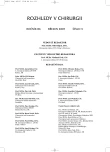New Aspects in Enteral Nutrition in Critical Patients at the Surgical Intensive Care Unit
Authors:
J. Šiller; M. Šácha; T. Daněk; K. Havlíček; Z. Grofová
Authors‘ workplace:
Fakulta zdravotnických studií, Univerzita Pardubice, prof. MUDr. A. Pellant, DrSc.
; Chirurgická klinika KN Pardubice, přednosta: doc. MUDr. K. Havlíček, CSc.
Published in:
Rozhl. Chir., 2007, roč. 86, č. 3, s. 139-141.
Category:
Monothematic special - Original
Overview
Introduction:
Nutritional support in critically ill patients has an impact on both prevention and treatment. Development of complications and organ failure can be prevented, good status of gut mucosa kept and positive nitrogen balance induced. Inflammatory response can be modulated.
Nutritional screening:
Patients undergoing major surgery should be actively screened for the nutritional risk level according to described parameters since it is considered to be very important for the postoperative period.
Enteral nutrition (EN) versus parenteral nutrition (PN):
Current study findings do not show any difference in mortality of critically ill patients with regard to the administration route. Inflammatory complications rate is significantly lower in EN patients.
ESPEN Guidelines on Enteral Nutrition:
The most recent recommendations for surgery patients are based on the evidence.
Conclusion:
There is a need for an active nutritional screening to find patients in the risk. Other important points are the following: a progressive approach to early enteral nutrition combined with PN, multiprofessional cooperation and protocol implementation.
Sources
1. Lochs, H., Allison, S. P., Meier, R., Pirlich, M., Kondrup, J., Schneider, S., van den Berghe, G., Pichard, C. Introductory to the ESPEN Guidelines on Enteral Nutrition: Terminology, Definitions and General Topics, Clinical Nutrition (2006) 25, 180–186.
2. Kreymann, K. G., Berger, M. M., Deutz, N. E. P., Hiesmayr, M., Jolliet, P., Kazandjiev, G., Nitenberg, G., van den Berghe, G., Wernerman, J. DGEM: C. Ebner, W. Hartl, C. Heymann, C. Spies: ESPEN Guidelines on Enteral Nutrition: Intesive care. Clinical Nutrition (2006) 25, 210–223.
3. Weimann, A., Braga, M., Harsanyi, L., Laviano, A., Ljungqvist, O., Soeters P. DGEM: K. W. Jauch, M. Kemen, J. M. Hiesmayr, T. Horbach, E. R. Kuse, K. H. Vestweber: ESPEN Guidelines on Enteral Nutrition: Surgery including Organ Transplantation. Clinical Nutrition (2006) 25, 224–244.
Labels
Surgery Orthopaedics Trauma surgeryArticle was published in
Perspectives in Surgery

2007 Issue 3
- Possibilities of Using Metamizole in the Treatment of Acute Primary Headaches
- Metamizole at a Glance and in Practice – Effective Non-Opioid Analgesic for All Ages
- Metamizole vs. Tramadol in Postoperative Analgesia
-
All articles in this issue
- Crossectomy Doesn’t Improve Outcome of Endovenous Laser Ablation of Varicose Veins
- Problematic of Reoperations for Persisting and Recurrent Primary Hyperparathyroidism
- Traumatic Pseudoaneurysm of Arteria Femoralis Profunda – The Case Report
- Penetrating Thoracic Injury – Seven-Year Experience with its Diagnostics and Treatment
- Lung Sequestration as an Accidental Finding in Adulthood. Surgical Therapy
- Partial Mastectomy vs. Breast Ablation in Treatment of Invasive Lobulary Carcinoma
- Reconstruction of Soft Tissue Defects of Lower Leg, Ankle and Foot using Sural Flap
- New Aspects in Enteral Nutrition in Critical Patients at the Surgical Intensive Care Unit
- Shot Injury of the Thorax Associated with the Left Carotid Trauma – A Case Review
- Perspectives in Surgery
- Journal archive
- Current issue
- About the journal
Most read in this issue
- Lung Sequestration as an Accidental Finding in Adulthood. Surgical Therapy
- Partial Mastectomy vs. Breast Ablation in Treatment of Invasive Lobulary Carcinoma
- Reconstruction of Soft Tissue Defects of Lower Leg, Ankle and Foot using Sural Flap
- Crossectomy Doesn’t Improve Outcome of Endovenous Laser Ablation of Varicose Veins
